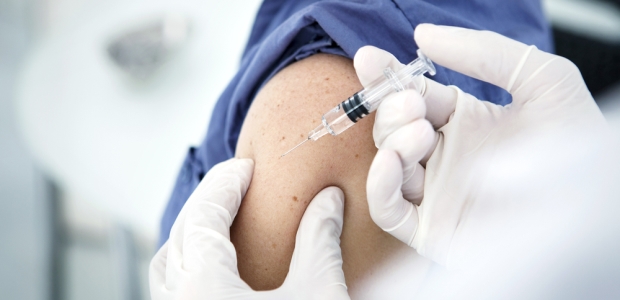
Study Supports Pharmacies' Dispensing of Vaccine During Flu Epidemics
During a more severe epidemic, adding pharmacies averted up to 23.7 million symptomatic cases, prevented up to 210,228 deaths, and saved $2.8 billion in direct medical costs, $97.1 billion in productivity losses, and $99.8 billion in overall costs.
Adding pharmacies to the mix, along with physicians' offices and hospitals, and extending their hours could streamline administering vaccinations in the event of a flu epidemic caused by a novel virus, a new study led by researchers at the Johns Hopkins Bloomberg School of Public Health found. This strategy could save thousands of lives and billions of dollars, the authors concluded.
Millions each year already get their annual flu shots at pharmacies. In the event of an influenza epidemic involving a virus that has not been seen before, such as during the 2009 H1N1 flu pandemic, getting enough of the population vaccinated as soon as possible is particularly important to reduce the spread and impact of the virus. Traditional health care locations alone, such as doctors' offices and hospitals, may not have the capacity or convenience to get enough people vaccinated. But, using a computer simulation model, the study's authors found that adding pharmacies as locations that dispense flu vaccinations during a mild epidemic averted up to 17.1 million symptomatic cases, prevented up to 104,761 deaths, and saved $1 billion in direct medical costs, $49.3 billion in productivity losses, and up to $50.3 billion in societal costs (direct medical and indirect costs combined).
During a more severe epidemic, adding pharmacies averted up to 23.7 million symptomatic cases, prevented up to 210,228 deaths, and saved $2.8 billion in direct medical costs, $97.1 billion in productivity losses, and $99.8 billion in overall costs.
The findings were published online Oct. 16 in the journal Vaccine. The study was conducted with researchers at the Walgreens Center for Health & Wellbeing Research,which Johns Hopkins Medicine supports through academic collaborations.
"Pharmacies offer a potentially more convenient alternative to health clinics and hospitals to get vaccinated," said Dr. Bruce Y. Lee, M.D., MBA, executive director of the Global Obesity Prevention Center at the Bloomberg School. "A pharmacy may be closer to you than your doctor's office or a hospital. Moreover, if pharmacies are open later, then people have a wider window of time to get vaccinated, such as during evenings, weekends, and other non-work hours. History has shown that another flu epidemic will occur, it is just a matter of when," he continued. "Our study shows that when it comes to a flu epidemic, location and convenience matter a lot. Adding pharmacies as vaccination locations could end up saving thousands of lives and billions of dollars depending on the severity of the epidemic."
"Our study shows that dispensing flu vaccines at pharmacies in addition to traditional locations can save third-party payers like insurance companies and Medicare billions of dollars and save businesses billions in productivity losses," added Sarah M. Bartsch, MPH, GOPC faculty and lead author of the study.
"Epidemiologic and Economic Impact of Pharmacies as Vaccination Locations During an Influenza Epidemic" was written by Sarah M. Bartsch, Michael S. Taitel, Jay V. DePasse, Sarah N. Cox, Renae L. Smith-Ray, Patrick Wedlock, Tanya G. Singh, Susan Carr, Sheryl S. Siegmund, and Bruce Y. Lee.